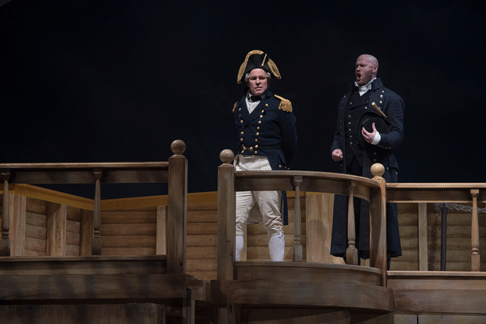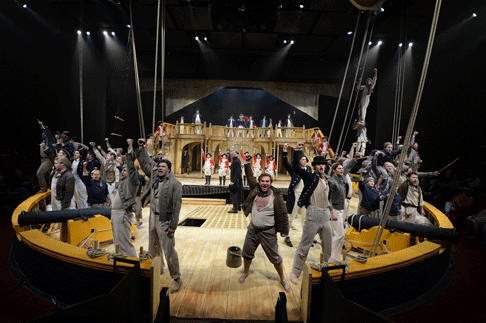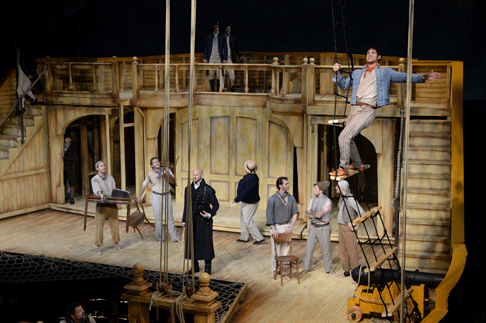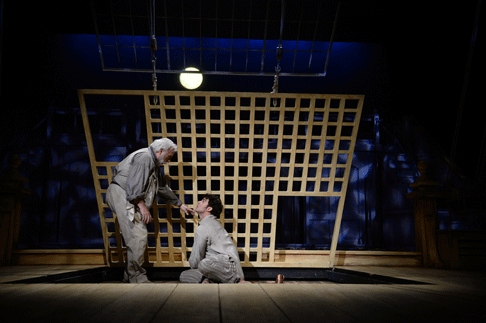![Claggart (Zachary James, right) falsely accuses Billy (Craig Verm, left) and Vere observes (Roger Honeywell). [Photo by Duane Tinkey]](http://www.operatoday.com/DSC_0260.png)
13 Jul 2017
Billy Budd Indomitable in Des Moines
It is hard to know where to begin to praise the peerless accomplishment that is Des Moines Metro Opera’s staggeringly powerful Billy Budd.
English Touring Opera are delighted to announce a season of lyric monodramas to tour nationally from October to December. The season features music for solo singer and piano by Argento, Britten, Tippett and Shostakovich with a bold and inventive approach to making opera during social distancing.
This tenth of ten Live from London concerts was in fact a recorded live performance from California. It was no less enjoyable for that, and it was also uplifting to learn that this wasn’t in fact the ‘last’ LfL event that we will be able to enjoy, courtesy of VOCES8 and their fellow vocal ensembles (more below …).
Ever since Wigmore Hall announced their superb series of autumn concerts, all streamed live and available free of charge, I’d been looking forward to this song recital by Ian Bostridge and Imogen Cooper.
Although Stile Antico’s programme article for their Live from London recital introduced their selection from the many treasures of the English Renaissance in the context of the theological debates and upheavals of the Tudor and Elizabethan years, their performance was more evocative of private chamber music than of public liturgy.
Evidently, face masks don’t stifle appreciative “Bravo!”s. And, reducing audience numbers doesn’t lower the volume of such acclamations. For, the audience at Wigmore Hall gave soprano Elizabeth Llewellyn and pianist Simon Lepper a greatly deserved warm reception and hearty response following this lunchtime recital of late-Romantic song.
For this week’s Live from London vocal recital we moved from the home of VOCES8, St Anne and St Agnes in the City of London, to Kings Place, where The Sixteen - who have been associate artists at the venue for some time - presented a programme of music and words bound together by the theme of ‘reflection’.
'Such is your divine Disposation that both you excellently understand, and royally entertaine the Exercise of Musicke.’
‘And there was war in heaven: Michael and his angels fought against the dragon; and the dragon fought and his angels, And prevailed not; neither was their place found any more in heaven … that old serpent … Satan, which deceiveth the whole world: he was cast out into the earth, and his angels were cast out with him.’
There was never any doubt that the fifth of the twelve Met Stars Live in Concert broadcasts was going to be a palpably intense and vivid event, as well as a musically stunning and theatrically enervating experience.
‘Love’ was the theme for this Live from London performance by Apollo5. Given the complexity and diversity of that human emotion, and Apollo5’s reputation for versatility and diverse repertoire, ranging from Renaissance choral music to jazz, from contemporary classical works to popular song, it was no surprise that their programme spanned 500 years and several musical styles.
The Academy of St Martin in the Fields have titled their autumn series of eight concerts - which are taking place at 5pm and 7.30pm on two Saturdays each month at their home venue in Trafalgar Square, and being filmed for streaming the following Thursday - ‘re:connect’.
The London Symphony Orchestra opened their Autumn 2020 season with a homage to Oliver Knussen, who died at the age of 66 in July 2018. The programme traced a national musical lineage through the twentieth century, from Britten to Knussen, on to Mark-Anthony Turnage, and entwining the LSO and Rattle too.
With the Live from London digital vocal festival entering the second half of the series, the festival’s host, VOCES8, returned to their home at St Annes and St Agnes in the City of London to present a sequence of ‘Choral Dances’ - vocal music inspired by dance, embracing diverse genres from the Renaissance madrigal to swing jazz.
Just a few unison string wriggles from the opening of Mozart’s overture to Le nozze di Figaro are enough to make any opera-lover perch on the edge of their seat, in excited anticipation of the drama in music to come, so there could be no other curtain-raiser for this Gala Concert at the Royal Opera House, the latest instalment from ‘their House’ to ‘our houses’.
"Before the ending of the day, creator of all things, we pray that, with your accustomed mercy, you may watch over us."
The doors at The Metropolitan Opera will not open to live audiences until 2021 at the earliest, and the likelihood of normal operatic life resuming in cities around the world looks but a distant dream at present. But, while we may not be invited from our homes into the opera house for some time yet, with its free daily screenings of past productions and its pay-per-view Met Stars Live in Concert series, the Met continues to bring opera into our homes.
Music-making at this year’s Grange Festival Opera may have fallen silent in June and July, but the country house and extensive grounds of The Grange provided an ideal setting for a weekend of twelve specially conceived ‘promenade’ performances encompassing music and dance.
There’s a “slide of harmony” and “all the bones leave your body at that moment and you collapse to the floor, it’s so extraordinary.”
“Music for a while, shall all your cares beguile.”
The hum of bees rising from myriad scented blooms; gentle strains of birdsong; the cheerful chatter of picnickers beside a still lake; decorous thwacks of leather on willow; song and music floating through the warm evening air.
![Claggart (Zachary James, right) falsely accuses Billy (Craig Verm, left) and Vere observes (Roger Honeywell). [Photo by Duane Tinkey]](http://www.operatoday.com/DSC_0260.png)
It is hard to know where to begin to praise the peerless accomplishment that is Des Moines Metro Opera’s staggeringly powerful Billy Budd.
In the intimate Blank Performing Arts Center space, we are not so much observing a wrenching drama as we are participating in it. Set Designer R. Keith Brumley has outdone himself (or anyone else) with a massive prow of a hulking wooden warship that engulfs the entire playing space right up to the edge of the front row of the crescent of spectators.
Cannons poke through and point down the aisles. There are two black Jacob’s (rope) Ladders left and right allowing actors to clamber precariously above the action below, and the audience behind. A large wooden grate on the forestage has openings to allow the cast to “scurry below.” Masts feature ropes tied off in various ways so that the audience is looking through them as if part of the action. Upstage is filled with a two-tiered structure, the top of which serves as an upper deck flanked by stairs. Below, the structure contains Vere’s office, which moves forward and is revealed by the removal of four panels. To suggest the sailors’ cramped quarters below deck, two side pieces advance as though suggesting “arms” that enclose the action. A large hanging grate is positioned above the scene to replicate the one the sailors crawled through down center.
 Captain Vere (Roger Honeywell) is confronted by Claggart (Zachary James)
Captain Vere (Roger Honeywell) is confronted by Claggart (Zachary James)
The excellence of Barry Steele’s remarkable, moody lighting design was surpassed only by his exquisite projections. Jonathan Knipscher’s distinctive costumes greatly illuminated the characters, and aptly defined the caste system of the differing military strata. Brittany Crinson’s detailed make-up effects, including wounds and scruffily dirt-smudged sailors contributed much to the successful look.
I had never experienced an opera this large and active in such an intimate space, and director Kristine McIntyre did a masterful job filling every nook and cranny with meaningful action and carefully rehearsed “spontaneity” without putting us on sensory overload. Having successfully negotiated this huge group around that limited space, I think Ms. McIntyre is ready to be a traffic controller at O’Hare. But she also knew when to let her forces be still. When Lisa Hasson’s impeccable chorus and the soloists stood and poured out their climactic, overwhelming war cry in Act Two, it was electrifying in its raw emotion.
Kristine also knows how to wring every conceivable variation out of well-motivated blocking, usage of levels, and meaningful character relationships. Each of the principals clearly understood the dynamic and arc of their roles, and the monologues were coached and crafted like one act plays. This was a remarkable directorial realization, one that nurtured faultless ensemble playing as well as encouraging stand-alone personal bests.
 “Now Is the Moment”
“Now Is the Moment”
Craig Verm was first a playful, then a powerful Billy Budd. Mr. Verm possesses a burnished, rolling baritone that has a particularly inviting timbre. He also has such a vibrant, handsome, guileless presence that “Oh, beauty, handsomeness, goodness” is an understatement. From his first, naïvely eager statements, through his affecting bouts of stammering, to his exultant "king of the world" arioso perched on the rope ladder, to his gradual disbelieving betrayal and assumption of a tragic stature, Craig was every moment the star vocal and theatrical presence that galvanized the performance.
He had the audience in the palm of his hand the entire opera. When he is falsely accused, and cannot answer the charge owing to his stammer, patrons actually leaned forward in their seats, wishing they could help him. When he desperately pleaded with Captain Vere to “save him,” I wish I had had the Kleenex concession. His final prison monologue was heart wrenching, even if he tired just a bit by its end. Never mind, you just won’t see a finer Budd than that on view from Craig Verm.
Much the same could be said for bass-baritone Zachary James as the evil John Claggart. His imposing stature, his bad boy good looks, and most of all, his searing, orotund vocal production combined to make him a definitive Master at Arms. While he is consistently insistent in enforcing his discipline, Mr. James finds astonishing nuance in his delivery, as he is both physically and intellectually attracted to Billy, all the while disgusted by it. You will likely never hear Claggart’s aria more passionately performed with compelling tortured feelings, yet with rock solid vocalism. And Zachary’s death spiral after the fatal punch, ending fallen flat on his face, was beyond any physicality I have ever seen in this critical plot moment.
 Billy Budd (Craig Verm on ladder): “Billy Budd, king of the world.”
Billy Budd (Craig Verm on ladder): “Billy Budd, king of the world.”
Completing the principal triangle, Roger Honeywell gave the performance of his life as Captain Vere. I have enjoyed any number of memorable, conscientious performances by Mr. Honeywell over the years but none has engaged him this completely. The part was written for the sometimes precious crooning of Britten’s life partner, tenor Peter Pears. Well, Roger was having none of that! He waded in to this troubled, challenged character with grit and a feisty self-awareness, and he deployed his potent tenor with skill and precision.
These days, Roger pulls a few tricks to negotiate a few of the uppermost, soft passages, but he puts every utterance in service of the drama. His tortured, internalized debate of how to do the right thing was anguishing in its dichotomy of duty versus ethics, correctness or compassion. He began and ended the show as a clouded soul, doddering barefoot in his bathrobe, almost a spectral presence. His was a mesmerizing interpretation, uniquely his own.
The entire cast was so uniformly splendid that it may be odious to single out any smaller roles, but I must commend at least a few. Michael Adams utilized his commanding baritone to great effect as Donald. His interplay with Billy in the rough housing musical challenge in the sailors’ quarters was delightful, and impetuously kissing Billy at its end was a sassy touch. Thomas Hammons’ mature baritone proved a real asset as a touching Dansker. Christian Sanders’ clear, shining tenor served the role of the Novice well, and Emmet O’Hanlon was his wonderfully sung Friend. Ryan C. Connelly had just the right, bright sound in his well-schooled tenor to succeed as Squeak. Dennis Jesse (Mr. Redburn) and Federico de Michielis (Mr. Flint) were distinctive vocal personalities, as was the smoothly sung Lieutenant Ratcliffe from Kristopher Irmiter.
 Dansker (Thomas Hammons) visits imprisoned Billy (Craig Verm)
Dansker (Thomas Hammons) visits imprisoned Billy (Craig Verm)
Finally, in the pit, David Neely conducted a brilliant, insightful performance of Britten’s masterpiece. Make that “Monster Piece.” Billy Budd is scored for a virtuoso orchestra, and the DMMO musicians rallied to meet every challenge. Maestro Neely, his cast and band have delivered unto us as great a musico-dramatic achievement as is possible.
I have seen six other good productions of this piece over my years of opera going and I have always thought that, when all its planets align, it should make me weep but it never quite did. Well, Mission Accomplished. When Vere sang his final, diminishing statements, and the “sail” descended from above with its projection of rolling waves; and when the final projections first showed a silhouette of Billy’s hanging corpse, then morphed to Billy’s wrapped body floating to the depths, and then to Billy’s handsome face dissolving into the waves; well, this was a moment of surpassing beauty. And damn if the tears aren’t streaming again right now. . .
James Sohre
Cast and production information:
Billy Budd: Craig Verm; Edward Fairfax Vere: Roger Honeywell; John Claggart: Zachary James; Mr. Redburn: Dennis Jesse; Mr. Flint: Federico de Michelis; Lieutenant Ratcliffe: Kristopher Irmiter; Red Whiskers: Steven Sanders; Donald: Michael Adams; Dansker: Thomas Hammons; Novice: Christian Sanders: Novice’s Friend: Emmett O’Hanlon; Squeak: Ryan C. Connelly; Bosun: Timothy Bruno; Maintop: Chris Carr; Arthur Jones: Ted Pickell; 1st Mate: Brandon Hendrickson; 2nd Mate: Jesse Stock; Cabin Boy: Benjamin Sarvis; Conductor: David Neely; Director: Kristine McIntyre; Set Design: R. Keith Brumley; Costume Design: Jonathan Knipscher; Lighting and Projection: Design: Barry Steele; Make-up and Hair Design: Brittany Crinson for Elsen and Associates; Chorus Master: Lisa Hasson